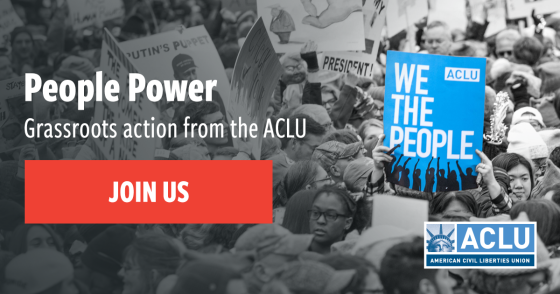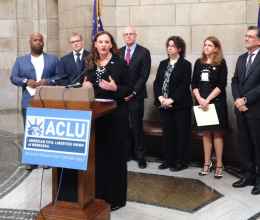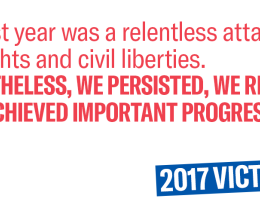
No one should be in jail simply because of the size of their bank account. Yet in Nebraska and around the country, thousands of individuals are simply too poor to pay fines and fees issued by the courts. Practices that were outlawed in the 19th century are still leading to poor people being trapped in a maze that only has one conclusion: mass incarceration.
A year ago, the ACLU told the story of Janet, a woman who was experiencing homelessness and living out of her car. She was one of the many individuals the ACLU’s report on bail and modern-day debtors’ prisons in Nebraska highlighted. One year later, we decided to check back in with county courts in Douglas and Lancaster counties to see how Nebraska judges are imposing fines and fees today. Had judges changed their practices to tailor the fines and fees to the individual and their ability to pay? Sadly, the short answer seems to be no.
Are you facing fines and fees from a court? Know Your Rights
We spent a total of two days in Douglas and Lancaster Counties this November to see how courts were responding to the ACLU’s report, bipartisan reforms from the Nebraska Legislature, and the nationwide movement to reform modern-day debtors’ prisons. At these initial hearings, most defendants were told of their charges, pled guilty, and were sentenced to a fine without any inquiry into their ability to pay—and with no attorney present—in a single one-stop-shop process taking less than five minutes. As practicing attorneys, we were surprised to see many of the same concerning practices we saw a year ago continuing.
- Rather than giving each individual a notice of their rights and ensuring they understood their rights, most rights advisories were given as a group. The judge read off the advisory at the beginning of the session and then never repeated it, even though many people arrived later and never heard the advisory.
- We never observed a court letting someone know they could request a waiver of fines or fees if they could demonstrate they could not afford to pay. We saw no instances where the judge asked a defendant about their ability to pay before imposing fines and fees.
- If someone asked for an attorney, even if their offense held the possibility of jail time, we saw that judges would not appoint public defenders because the prosecutor was not seeking jail time in that specific case. Many of the individuals before the court ultimately do end up in jail when they can’t pay their fines—and yet they never had an attorney.
Courts need to stop people from getting trapped in a maze of fines and fees. We’re working to empower individuals and advocates to take action on their own by providing forms and instructions to help poverty-stricken Nebraskans in court.
Debtors’ prison practices in Nebraska courts are unconstitutional and inhumane. Nebraskans from across the political spectrum have seen that these practices do nothing to support public safety. It is time for Nebraska’s courts to use the discretion they h-ve and for each of us to know about our rights in court.
The reality is that these practices are hurting Nebraskans. Here are just a few stories of people who were in court on the days we observed. Their names and certain identifying information have been changed to protect their identities.
Stacey
Stacey is a 35-year-old single mother of two who was charged with theft. She was accused of stealing less than $10 of household items from a local dollar store when she thought she had store credit for returned merchandise. Stacey decided she would plead guilty to the charge so she wouldn’t have to come to court again and find child care for her children. Without asking about her financial situation, the judge ordered that Stacey pay $200 plus court costs. Because she could not afford the fine, Stacy could face jail time for a misunderstanding around $10 of merchandise.
Steven
Steven is a 45-year-old Asian man who does not speak English and appeared in court with an interpreter. Steven was charged with not having car insurance, speeding and other car-related offenses. Steven did not understand the ticket and didn’t know he needed to go to court and a failure to appear charge was also added. Steven told the judge that he had just gotten the vehicle and was taking his son to school when he got pulled over. Steven’s fines totaled more than $300. After the judge imposed the fines, Steven told the judge that he is sick and cannot work. He asked how he will be able to pay such a large amount. Though the judge said he could work out a payment plan and possibly do community service instead of paying the fine, Steven, like many defendants, left the courtroom with a great sense of uncertainty. Even with the payment plan would he be able to afford the large fine? Given his physical ailments, would he even be able to complete community service? If he can't pay the fine or complete community service, Steven could end up in jail.
Camila
Camila is a 19-year-old Latina woman who was charged with resisting arrest and disorderly conduct following an incident at her parent’s house. Prior to Camila coming into the courtroom, the presiding Judge gave an oral rights advisory to the entire room. However, Camila had come in late and did not hear the rights advisory. Camila did not have an attorney at her side and looked intimidated. The judge noted that although Camila had already been in jail for a day she was eligible for a diversion program. Camila asked for more information, including if there was a cost to enroll in the program. The judge answered "about $200.00," but if Camila wished to waive the program the judge would credit the day Camila stayed in jail and she would only owe $50. Because Camila could not afford $200 for the diversion program, these charges will remain on her permanent record.
Despite the concerning practices that remain in effect, work has been done to address the maze of fines and fees that leads to people being jailed simply because they can't afford their fines. LB 259, which goes into full effect in July 2019, makes changes to how fines are imposed and enforced.



